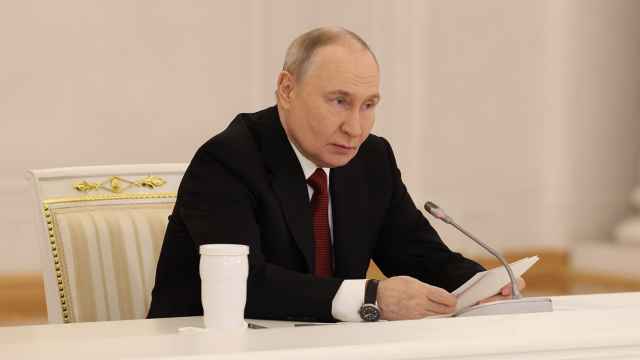A scientific research center in Siberia said Wednesday that it has discovered a new strain of HIV in Russia and that the virus is spreading "at a rapid rate."
The subtype, known as 02_AG/A, was first detected in the Siberian city of Novosibirsk in 2006 and now accounts for more than 50 percent of new HIV infections in the region, Novosibirsk's Koltsovo science city said in a statement.
The number of HIV-positive people living in the Novosibirsk region has leaped from about 2,000 in 2007 up to 15,000 in 2012, the statement said, citing Russia's Federal AIDS Center.
The new strain might be the most virulent form of HIV in Russia, said Natalya Gashnikova, head of the retroviruses department at the Vektor state biotechnology research center at Koltsovo, whose specialists discovered it.
She said the virus could spread much faster than Russia's current leading HIV strain, subtype A(I).
The new strain is not limited to the vast area of Siberia. It has been detected in the North Caucasus republic of Chechnya, as well as the former Soviet republics of Kyrgyzstan and Kazakhstan, the institute said.
HIV, a retrovirus that causes slow failure of the immune system, has two types: HIV-1 and HIV-2. The latter is considered less virulent and transmissible.
Scientists say HIV-1 is the most common strain, and divide it into subtypes based on various forms that are grouped in geographic regions around the world.
According to the United Nations, Eastern Europe and Central Asia are the only regions in the world where the HIV infection is clearly on the rise. Fifty two percent of the HIV-positive people that live across that area are in Russia.
The disease remains poorly understood in Russia and, according to experts at Koltsovo, research into the spread and properties of new HIV strains is underfunded.
Russian schools generally offer little or no sex education, a factor that is believed to contribute to a high HIV infection rate from lack of awareness about sexually transmitted diseases.
Pavel Astakhov, Russia's children's rights advocate, said in September that he opposed teaching teenagers about sexual health in school, adding that Russian literature is "the best sex education there is."
A Message from The Moscow Times:
Dear readers,
We are facing unprecedented challenges. Russia's Prosecutor General's Office has designated The Moscow Times as an "undesirable" organization, criminalizing our work and putting our staff at risk of prosecution. This follows our earlier unjust labeling as a "foreign agent."
These actions are direct attempts to silence independent journalism in Russia. The authorities claim our work "discredits the decisions of the Russian leadership." We see things differently: we strive to provide accurate, unbiased reporting on Russia.
We, the journalists of The Moscow Times, refuse to be silenced. But to continue our work, we need your help.
Your support, no matter how small, makes a world of difference. If you can, please support us monthly starting from just $2. It's quick to set up, and every contribution makes a significant impact.
By supporting The Moscow Times, you're defending open, independent journalism in the face of repression. Thank you for standing with us.
Remind me later.





